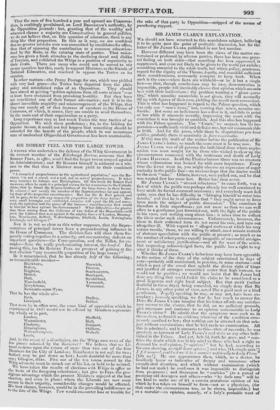SIR ROBERT PEEL AND THE LARGE TOWNS.
A WRITER who undertakes the defence of the Whig Government in the current number of' the Edinburgh Bedew, assumes that Sir ROBERT PEEL, in olive, would find the larger towns arrayed against his Administration ; and Sir Roomer himself is adduced as a wit- ness to the filet that a Minister must yield to their combined power. " A numerical preponderance to time agricultural population," says the Re- viewer, " is not a moral, not a real, not tot actual preponderance. It takes many counties to balance one Birmingham. Of this truth Sir Robert Peel was aware, when he made it a principal excuse for his concession to the Catholic claims, tint he found the Representatives of the large towns in their favour. Ile estimated not merely the number of the Representatives for and against, but those of the respective constituencies. But has Sir II. Peel gained, and will he gain, to his side nay reasonable proportion of the large towns? how
many small boroughs and subdivided counties will equal the life and move-
ment, the agitation and the power of the immense constituencies that would be bromzlit to bear against his Government ? What difficulties—far greater than those arising from the disfavour of two ladies of the Household—will await the Cabinet that sees against it the mighty forces of London, Birming- ham, Manchester, Salford, Wolverhampton, Sheffield, Leeds, Nottingham, Lliaburgh, and Glasgow ?"
Now it is not so clear as this writer supposes, that the Repre- sentatives of principal towns have a preponderating influence in the House of Commons. The division-lists will show them fre- quently voting together in a minority, and encountering defeats on important questions—the Corn-question, and the Ballot, for ex- amples—from the really predominating interest, the landed. But passing this, has Sir PLOItERT PEEL no prospect of gaining at the next election "any reasonable proportion of' the large towns " Be it remembered, that he has already kaff of the following; no inconsiderable number—
Blackburn, Norwich, Bolton, Preston, Brighton, Southampton, Bristol, Stockport, Hull, Sunderland, blacelesfield, Yarmouth, Marylebone, 'Worcester. Newcastle-upon-Tyne,
That he has the whole of—
Bath, Dudley, Belfast. Liverpool,
That were he in office now, the same kind of' opposition which he experienced in IS35 would not be offered by Members represent- mg,, wholly or in part,
London, Sheffield, Westminster, Hull, Finsbmwy, Bridport, Birmingham, Oldham, Wolverhampton, Walsall. Leeds,
Ind, in the event or a dissolution, are the Whigs sure even of the few places selected by the Reviewer? We believe that no Li- beral reckons upon the return of more than two out of the four Members for the City of London ; Manchester is not safe for two ; Salford may be put down as lost ; Leeds doubtful for more than oge; Glasgow, ditto. Five out of the ten towns named by the
lag advocate must be struck out of his list, or held to be neutral.
We have taken the results of elections with Whigs in dfiee as the basis of the tbregoing calculation ; but give to PEEL the pm- digmus advantage which the present Ministers enjoyed at the last election, and eveu in places where the Liberals are now most secure in their majority, considerable changes would be .affected. His best chance, however, would be in the prevailing indifference as to the fate of the Whigs. . Few would encounter loss or trouble for


























 Previous page
Previous page